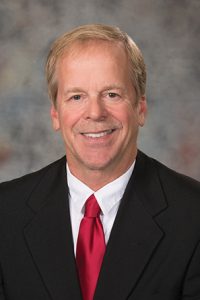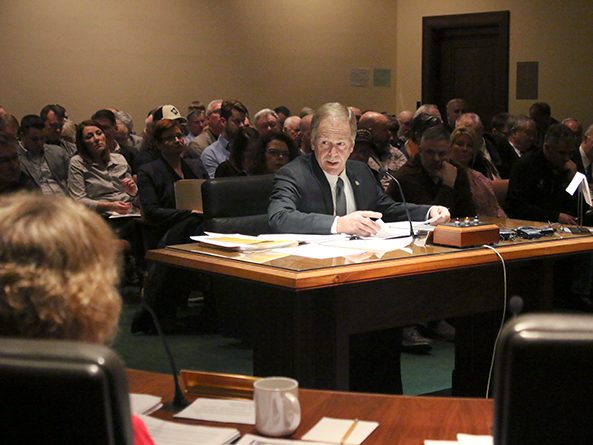Proposed sales tax hike would pay for property tax credits, school aid
The Revenue Committee heard testimony Feb. 14 on a bill that would raise the state sales tax rate, end several state sales and use tax exemptions and impose a surtax on high incomes to pay for additional property tax credits and state aid to public schools.
Albion Sen. Tom Briese, sponsor of LB314, said the bill would provide “immediate and substantial” property tax reductions and is more responsible than other proposals that do not generate additional tax revenue.
“As the naysayers and special interests try to pick this thing apart, you’ve got to ask yourself: How else are we going to deliver property tax relief Nebraskans are demanding in a responsible way?” Briese said. “The only way to do it is to raise revenue.”
LB314 would raise the state sales tax rate from 5.5 percent to 6 percent, repeal a personal property tax exemption and eliminate sales and use tax exemptions for a number of services including motor vehicle repair, personal care services and lawn care. It also would impose state sales tax on candy, soft drinks and bottled water.
The bill would apply a 7.84 percent surtax on the income tax liability of those with a federal adjusted gross income of $500,000 or more for those filing as individuals and $250,000 or more for other filers.
The bill also would raise the tax on a pack of cigarettes from 64 cents to $2.14.
As introduced, LB314 would raise excise taxes on the manufacture or wholesale of beer, wine and alcohol and spirits. Briese said an amendment would scale back that increase to address concerns of the state’s craft brewers. The amendment instead would impose a 3 percent sales surtax on alcohol.
The bill would direct additional revenue from these and other changes to the state’s property tax credit cash fund. The state Department of Revenue estimates LB314 would direct an additional $268 million to the fund in fiscal year 2019-20 and a further $654 million in FY2020-21.
The additional revenue also would be used to increase state aid to public schools, Briese said. The Legislative Fiscal Office estimates the bill would direct an additional $81 million in allocated income taxes and $180 million in special education reimbursement funds to schools in FY2020-21.
John Hansen, president of the Nebraska Farmers Union, testified in support of the bill, saying it is meant to correct an imbalance in how the state funds public schools. An incremental reduction in state aid over the last 30 years has shifted more of that cost onto property taxpayers, he said.
“It’s time to revisit our revenue streams,” Hansen said. “We need a more fair and balanced tax system, we need to adequately fund K-12 education and we must reduce our overuse of property taxes.”
Jack Moles testified in support of LB314 on behalf of the Nebraska Rural Community Schools Association and the Nebraska Council of School Administrators. Both groups understand that the bill is a “heavy lift,” he said, but 175 out of 244 public school districts currently receive no state equalization aid.
“This means districts have had to put more and more revenue demands on the backs of local property owners, especially our ag landowners, and that in itself is a heavy lift, one that we need to lighten,” Moles said.
Tiffany Friesen Milone, policy director at OpenSky Policy Institute, also testified in support. She said the proposal is a “fiscally responsible solution” to the state’s high reliance on property taxes to fund public schools. The bill pays for investments in property tax credits and school aid by broadening the state’s sales tax base and eliminating loopholes and tax breaks for the state’s high earners, she said.
OpenSky is concerned that the proposed sales tax rate increase could disproportionately harm low- and moderate-income Nebraskans, Friesen Milone said, but the proposed increase in the state’s earned income tax credit could offset it.
Testifying in opposition to the bill was Bryan Slone, president of the Nebraska Chamber of Commerce and Industry. He said increasing sales and income taxes to reduce the state’s overreliance on property taxes to fund public schools has not worked in the past.
To address the problem, Slone said, the Legislature first should reform the state’s school aid formula, limit local government spending, diversify the state’s economy and enforce the collection of state sales tax by remote sellers.
“The last source, from our point of view, should be raising new tax revenues that would have a detrimental economic effect and offset what we’re trying to do here,” he said.
Kathy Siefken, executive director of the Nebraska Grocery Industry Association, also testified in opposition. She said point-of-sale systems in Nebraska grocery stores are not set up to identify candy, bottled water and soda as taxable items. Upgrades would be prohibitively expensive for many small stores, Siefken said.
“Even the expensive databases that list taxable and nontaxable items only include 50 percent of taxable products, leading retailers to a guessing game of what to tax and what not to tax,” she said.
Also testifying in opposition was Jim Engelbart, operations manager at Empyrean Brewing Co. and president of the Nebraska Craft Brewers Guild. Nebraska already has a higher excise tax on beer than any neighboring state, he said, and the proposed increase would make its beer tax the highest in the country.
“In 20 years in this business,” Engelbart said, “it would be the single biggest price increase we’ve ever had to take as a manufacturer.”
Sarah Curry, policy director at the Platte Institute, also testified in opposition. The Platte Institute supports expanding the state’s sales tax base, she said, but the proposed tax increases would hurt the state’s economic growth.
Additionally, Curry said, the bill does not include a mechanism to ensure that local property taxing entities would reduce their property tax rates if it passes.
“Increasing tax rates as a funding mechanism could be especially harmful without including the proper safeguards to assure lasting reforms,” she said.
The committee took no immediate action on LB314.


